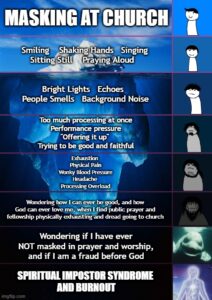Lenten Resolutions
by Aimée O’Connell
With the season of Lent just up ahead, I would like to offer Autism Consecrated’s take on Lenten resolutions. Boiled down, these would be something like this:
- Learn about my neurobiological infrastructure
- Live within my neurobiological means
- Patiently, politely, cheerfully refuse* to exceed those means
- Consecrate my neurodivergence to God, offering Him all that I am, that I may bear witness to autism’s belonging in the Body of Christ
(* This phrase, “cheerfully refuse,” is a direct nod to the title used by Leif Enger in his 2024 novel. That wording captures how I strive to face confrontation when trying to be faithful to my needs, and I express my sincere gratitude for his giving the world that phrase.)
Awhile back, I was asked in an interview what advice I might give to autistic individuals and families who are seeking to strengthen their connections to God and their faith communities. My response from then fits very well with the way I recommend forming our Lenten resolutions.
First: Understand what autism is, and what it is not. Learn about autism from neuroaffirming sources and from fellow autistic people.
Second: Consider that the autistic neurotype is part of God’s design, and contemplate the intentionality of that being part of our lives. How have the autistic aspects of our lives shaped us, and how have they shaped the people around us?
Third: Consider consecrating our autism to God, that He may lead us to where we will be most fruitful, exactly as we are.
Fourth: Be forthright with our needs. The more comfortable we are with our limitations, the more others will become comfortable supporting them. It takes mutual, voluntary humility to admit when we don’t know what to do but are willing to support one another in figuring that out together.
Fifth: Never forget that God loves us and knows our limitations. So long as we sincerely desire to grow ever closer to God, we cannot let Him down or disappoint Him simply because we are neurodivergent or are struggling to keep up with the obligations and demands on our processing.
Sixth: Keep the conversation going as long as it takes for the people in our parishes to better understand and support its autistic members of all ages, not just children. And: Remember that starting a “conversation” does not necessarily require speaking or depend on traditional communication. It was St. Francis who said we do well to preach the Gospel at all times, but use words only when necessary… and it was the one-person-at-a-time example of St. Thorlak, not his words, which comprised his legacy and led to his canonization. Being authentically and cheerfully who we are, autistic and all, is mission work to the rest of the Church.
Once again this year, Autism Consecrated is offering Daily Intentions for Autism’s Belonging in the Body of Christ as a season-long deep-dive into various aspects of neurodivergence, seeking in prayer to build better understanding of and support for neurodiversity in our parish communities. These daily reflections serve as a prayer for the Church, but can also be a means of learning more about our neurobiological infrastructure, in line with the Lenten resolutions suggested above. The Daily Prayers for Autism’s Belonging are free for individuals and groups (including parishes) to pray, print, download and share.
Likewise, The Scriptural Stations of the Cross for Autistic People by autistic Catholic priest Fr. Mark Nolette are based on his firsthand experiences and a desire to unite the gifts and challenges of neurodivergence to the suffering and redemption of Jesus. This devotion may be accessed directly on our website or downloaded in print and audio formats (English).
And then, the Prayer to Consecrate Autism is also on our website, free to access and download and pray for ourselves or on behalf of someone close to us.
Let us all pray that the upcoming season of Lent will be fruitful for all of us, in the ways we need that most.




